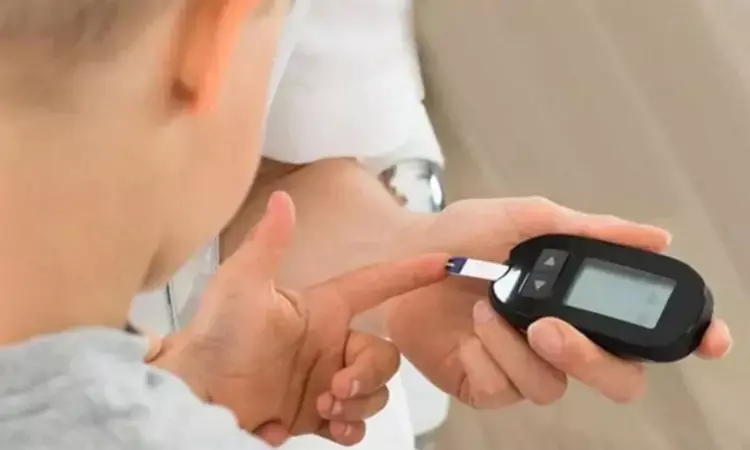- Home
- Medical news & Guidelines
- Anesthesiology
- Cardiology and CTVS
- Critical Care
- Dentistry
- Dermatology
- Diabetes and Endocrinology
- ENT
- Gastroenterology
- Medicine
- Nephrology
- Neurology
- Obstretics-Gynaecology
- Oncology
- Ophthalmology
- Orthopaedics
- Pediatrics-Neonatology
- Psychiatry
- Pulmonology
- Radiology
- Surgery
- Urology
- Laboratory Medicine
- Diet
- Nursing
- Paramedical
- Physiotherapy
- Health news
- Fact Check
- Bone Health Fact Check
- Brain Health Fact Check
- Cancer Related Fact Check
- Child Care Fact Check
- Dental and oral health fact check
- Diabetes and metabolic health fact check
- Diet and Nutrition Fact Check
- Eye and ENT Care Fact Check
- Fitness fact check
- Gut health fact check
- Heart health fact check
- Kidney health fact check
- Medical education fact check
- Men's health fact check
- Respiratory fact check
- Skin and hair care fact check
- Vaccine and Immunization fact check
- Women's health fact check
- AYUSH
- State News
- Andaman and Nicobar Islands
- Andhra Pradesh
- Arunachal Pradesh
- Assam
- Bihar
- Chandigarh
- Chattisgarh
- Dadra and Nagar Haveli
- Daman and Diu
- Delhi
- Goa
- Gujarat
- Haryana
- Himachal Pradesh
- Jammu & Kashmir
- Jharkhand
- Karnataka
- Kerala
- Ladakh
- Lakshadweep
- Madhya Pradesh
- Maharashtra
- Manipur
- Meghalaya
- Mizoram
- Nagaland
- Odisha
- Puducherry
- Punjab
- Rajasthan
- Sikkim
- Tamil Nadu
- Telangana
- Tripura
- Uttar Pradesh
- Uttrakhand
- West Bengal
- Medical Education
- Industry
COVID-19 not linked to development of type 1 diabetes in children: NEJM

USA: COVID-19 infection didn't appear to precipitate a diagnosis of type 1 diabetes in children according to a prospective, multinational cohort study of children conducted efore and during the COVID-19 pandemic in contrast to studies in which Covid-19 testing was not done.
In their study, published in The New England Journal of Medicine, the researchers tested more than 4,500 adolescents every few months for SARS-CoV-2 infection, type 1 diabetes, and vaccination antibodies from 2020 through 2021. However, they found no difference among the 45 kids with a diagnosis of type 1 diabetes during this time when it came to COVID-19 infection history.
"These findings must be tempered somewhat because they reflect a narrow age range among kids with an increased genetic risk of type 1 diabetes," Jeffrey P. Krischer, University of South Florida, Tampa, FL, and colleagues wrote in their study.
Previous studies have widely reported an increased incidence of type 1 diabetes in kids during the coronavirus disease 2019 (Covid-19) pandemic. Dr Krischer and colleagues conducted a study comprising 4586 children aged 9 to 15 years from Germany, Finland, Sweden, and the US.
Follow-up of the children was done from January 2020 (pre-pandemic) through December 2021 (pandemic). They were tested every 3 months for T1D if they had islet autoantibodies (440 participants) and every 6 months if they did not (4146 participants).
Testing of the children was done for SARS-CoV-2 (severe acute respiratory syndrome coronavirus 2) nucleocapsid (infection) and spike (vaccination) antibodies at each follow-up visit.
The authors reported the following findings:
- Five of the children were diagnosed with type 1 diabetes before testing positive for SARS-CoV-2 nucleocapsid antibodies. One child was diagnosed with diabetes after a COVID infection.
- For the other 39 kids diagnosed with type 1 diabetes during the study, they never had a positive test for nucleocapsid antibodies. Of these, 30 were never vaccinated, two were vaccinated before the diagnosis of type 1 diabetes, four were vaccinated after the diagnosis, and three were not tested.
- Among the 4,586 children ages 9 to 15 included in the study, 15.4% tested positive for SARS-CoV-2 nucleocapsid antibodies. This included 15% of 4,146 children without islet autoantibodies and 18.6% of 440 children with islet autoantibodies.
- For kids without islet autoantibodies, only 40 kids experienced seroconversion to persistent and confirmed positivity for islet autoantibodies. Of these kids, only five had nucleocapsid antibodies -- which appeared after seroconversion. The other 35 kids never tested positive for nucleocapsid antibodies.
- None of the other 623 children without islet autoantibodies who had SARS-CoV-2 infection experienced seroconversion. Seroconversion was seen only in the 1% of children without islet autoantibodies who didn't have a SARS-CoV-2 infection.
- Participants were located in Finland, the U.S., Germany, and Sweden, with Sweden having the highest rates of COVID-19 among children (21.5%).
- COVID-19 rates were double for those with a BMI between 36 and 40 (30%).
"Despite the plausibility of a biologic connection, systematic testing for the virus and T1D in a prospective, multinational cohort of children before and during the pandemic did not reveal that Covid-19 precipitated type 1 diabetes, in contrast to studies in which Covid-19 testing was not performed," the authors concluded.
Reference:
Krischer JP, Lernmark Å, Hagopian WA, Rewers MJ, McIndoe R, Toppari J, Ziegler AG, Akolkar B; TEDDY Study Group. SARS-CoV-2 - No Increased Islet Autoimmunity or Type 1 Diabetes in Teens. N Engl J Med. 2023 Aug 3;389(5):474-475. doi: 10.1056/NEJMc2216477. PMID: 37530831.
Dr Kamal Kant Kohli-MBBS, DTCD- a chest specialist with more than 30 years of practice and a flair for writing clinical articles, Dr Kamal Kant Kohli joined Medical Dialogues as a Chief Editor of Medical News. Besides writing articles, as an editor, he proofreads and verifies all the medical content published on Medical Dialogues including those coming from journals, studies,medical conferences,guidelines etc. Email: drkohli@medicaldialogues.in. Contact no. 011-43720751


